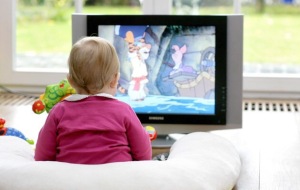How many times have you heard the following phrases:
“Don’t let them watch too much television, it’ll rot their minds”
“Those video games, they’ll make him violent!”
“You never know what they’re looking at on the internet…”
“Why would she need a phone? She’s a child.”
I saw this Dateline 20/20 Nightline whatever episode recently that said “we” (me and you, current parents of small children) are raising the “Plugged-In Generation.” And it’s this horrible, scary thing where our kids are ruled by technology, and their minds really are mush and they’re doomed to be socially inept their entire lives because computers and smart phones will do everything for them. Okkkk….
So then I visited a mom friend the other day that told me that they have their television on for a total of 30 minutes a day. THIRTY. I found this out when naptime was approaching for the kids so I turned on a quiet cartoon, went to the bathroom, came back and the tv was off. Alrighty then.
Is it true? Is all the technology of today still rot-your-brains-out horrible? I’m not so sure.
Call me Mom of the Year, but my tv is rarely off. Sorry Mom Friend, but I think you’re a little nuts. But I also don’t want my kid to only speak in Jake the Pirate lingo and not be able to function outside of a computer screen…
And when I say my tv is on all day, listen, I’m a stay at home, military mom. My DH is in and out constantly and I just can’t be in a house alone with my LO, sitting in silence all day. But that also doesn’t mean I park her in front of the tube and she sits in zombie mode for hours on end. In the mornings, we snuggle and watch a few episodes of Curious George. And then she’s off. Sometimes its a cute, toddler-appropriate cartoon in the background, sometimes it’s the Disney Pandora station. But my tv is on for the majority of the day for the simple purpose of background noise.
So besides my tv always being on, what other brain-rotting sins do I commit? Well I have a Fisher Price app on my tablet that she loves to play and if she could figure out Facetime on my phone, I’m sure she’d call my sister 37 times a day.
I’m a little conflicted here. I’m not a doctor or a scientist. Just a sahm, shrink in training (read: grad student in Professional Counseling), trying to make the best, most practical choices I can for my kid. So here’s my opinion:
1. Cartoons aren’t what they used to be. When we were little, it was Rugrats, Scooby Doo and Wiley Coyote being blown up by a bird. Now, my child has a ridiculous amount of educational shows to choose from. And they really are educational. Daniel Tiger learns how to share, Curious George does odd jobs to buy a kite, and Sofia the First deals with bullies. These are life lessons, in bold colors, with catchy songs that kids remember.
2. Use technology to your advantage. Sure, as your children get older they’re going to learn that there is a world of opportunity available out there on the internet. So be smart. Use the parental settings on your smart phones, your cable and your internet plans. Block what you don’t want them to have access to, give them kid-safe technology like a Leap Pad. As they get older, regulate who they can and cannot contact on their phones. Technology is expanding every minute but that doesn’t mean you have to be an ignorant parent. Stay up to date and monitor what you child, at any age, has access to.
3. Be safe. Get your middle schooler a phone if you want. Shoot, get your elementary schooler a phone. Give them text and call services and teach them that this is for emergencies only. Sure they may text their friends when you turn your back, but this isn’t a Mayberry,-leave-your-doors-unlocked kind of world anymore. My child having a way to contact me should there be, God forbid, some horrible event happening at their school or just some creeper near the bus stop, gives me peace of mind. It’s a safety measure I think is necessary here in 2015.
4. Teach them OTHER things. Start young. Have scheduled play time OUTSIDE, every day if possible. Read to them. Read in front of them. Instill in them a joy of reading, crafts, music, couch-fort building and imaginary tea parties as soon as you can. The more you encourage non-technology related activities and make them appealing to your children, the less they’ll even care about watching Frozen for the 94th time this week.
Promoting the fun in other activities will also help avoid that feeling that they are addicted to technology. It can be helpful to reward positive behavior in your children, especially when they are toddlers. But constantly using your own personal phone or tablet as a reward WILL turn around and bite you when you eventually need to take it away, resulting in that dreaded inconsolable tantrum in the middle of Walmart that we all love. Try stickers or a musical toy, something fun they don’t always have access to as an incentive for good behavior.
If you want them to have “app time” during the day, schedule it into your routine. This way, they’ll know when to expect time on the tablet and won’t demand it at random moments throughout the day. Routine works!!!
5. Lead by example. The phone/tablet/laptop/smart watch…whatever…put it away. Don’t text and drive. Don’t check emails at dinner. EAT DINNER AT THE TABLE. Talk to your kids, no matter how young they are. I’m a student and I write for this super awesome blog so I suppose you could say I “work from home.” My child sees me use technology often. But I make technology-free time for her all day long. When you’re interacting with your child, be present. Listen when they have something to say. Set the example that you want them to follow.
I really don’t care how many hours a day my television is on. I’ll give my kid a tablet to play an age-appropriate app every now and then. What’s important is that technology doesn’t rule her life. I’m teaching my child how to speak politely to adults, the importance of fitness and a love of several different hobbies that don’t involve a keyboard or remote.
In the right context, technology can be so beneficial for children of all ages. We need to be forward-thinking parents. We need to not be ignorant to changing technology and current safety precautions. Keep up with your kids, stay current in their lives, and set the example you want them to follow. Technology isn’t the enemy, poor parenting is. We can’t protect them from everything, but we can guide them toward becoming successful, intelligent, social human beings that don’t have carpel tunnel from video games, but instead understand the value of new, evolving sciences that will shape their tomorrow.
-Chelsea


I love your stance on this! You have such good insight on balance with technology and kids!
LikeLike
Thanks so much for reading and your kind words! I think we’re all just trying to do the best we can for our kids while keeping up to date with the changing world around us 😊
LikeLike
Well said. Times have changed and it’s what kids play with now but it doesn’t have to be all negative. The stuff they do on the tablets can be quite educational compared to watching TV all day. My 7 year old knows more about technology than me. ! As long as We’re still there as parents to love and nurture them and teach them right from wrong I can’t see the harm in a little technoloy time ☺
LikeLiked by 1 person
I couldn’t agree with you more! As long as the technology is teaching them skills and not replacing us as parents, then I don’t see the harm. It’s the quality time with parents that matters the most! Thanks so much for reading!
LikeLike
I think we over anyalyse how we’re told to rear children these days. My motto is ‘if they are happy and in one piece by the end of the day we’ve done something right ‘ ☺
LikeLiked by 1 person
My son did not watch TV until he was three. Now it is Netflix so no scary or inappropriate commercials. I can be sure exactly what he is watching. He has apps for reading and writing, spelling, math, painting, music, and even science. He has an app that teaches him time. I LOVE it. However, we make time to play outside and draw and do art with his hands. It can seriously damage their hands to do only tablet/phone movements. I can’t even remember the last time my TV was on. The important thing like you said is that there is a balance. Great post. 🙂
LikeLiked by 1 person
Thank you so much for sharing your experience! Every family is different and I couldn’t agree more, too much of tablet time, computer time, video games, etc all can become unhealthy! It’s quality time with family, getting outdoors and being creative that will help break up that technology time. Technology can be so beneficial within a proper balance 🙂
LikeLiked by 1 person
Our tv is never off either. I don’t sit my baby in front of it all day (barely at all) but if a cartoon catches her eye I am happy to let her watch. She loves many things and sometimes the television is one of those things. Great post!
LikeLiked by 1 person
Thanks so much for reading!
LikeLike
This is exactly what I was trying to explain to my husband when I put a tablet on my amazon wishlist. My tv is on all day and the only time my daughter pays attention to it is when there is a song playing. She stops for that ten seconds to watch then goes back to what she’s doing. I think it’s an important skill to learn how to navigate technology because this how life is now. Kids use computers and tablets at school all the time, as long as it’s not mindless things, I don’t care so much what they do on technology.
LikeLiked by 1 person
I have a good friend that works at an inner-city school. She says that they receive grants regularly for all of this incredible technology for students to use and take their state tests on. She’s told me stories of children breaking down in tears not because the test was challenging, but because they simply couldn’t figure out the computer.
We have to keep our children current with technology. It’s absolutely critical to their future! Most people only think of it as a silly entertainment source but with proper guidance from a parent, it can be and important learning tool! Thanks so much for reading!
LikeLiked by 1 person